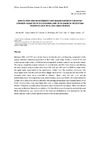Identificador persistente para citar o vincular este elemento:
https://accedacris.ulpgc.es/jspui/handle/10553/17909
| Título: | Density, nest site characteristics and breeding rates of the osprey (Pandion haliaetus) in the southern limit of its range in the Western Palearctic (Boa Vista, Cape Verde Islands). | Autores/as: | Siverio, Manuel López, Pedro Siverio, Felipe Rodríguez, Beneharo Varo-Cruz, Nuria López-Jurado, Luis F. |
Clasificación UNESCO: | 24 Ciencias de la vida 2401 Biología animal (zoología) 240120 Ornitología |
Palabras clave: | Conservation Density Geographical variation Osprey Productivity, et al. |
Fecha de publicación: | 2014 | Publicación seriada: | African Journal of Ecology | Resumen: | Between 2004 and 2007, we studied density, habitat features and breeding parameters of the osprey (Pandion haliaetus) population in Boa Vista Island (Cape Verde). A total of 79 nest structures were identified, 37 of which were occupied for at least 1 year during the study period. The osprey population ranged between 14 and 18 pairs, and the mean density and distance between neighbouring occupied nests were 2.58 pairs per 100 km2 and 3089 m, respectively. Occupied nests were found to be significantly further from the coastline and roads than unoccupied nests, but the distances from villages were similar. The majority (81.1%) of the 37 occupied nests were easily accessible to humans. Mean clutch size was 2.59, average productivity was 0.76 young/active nest, and breeding success was 58.8% [Correction added on 13 May 2013, after first online publication: the average productivity was changed from 0.72 to 0.76]. Density in Boa Vista was higher than that in other sedentary island populations in the Western Palearctic, whereas the productivity was the lowest of this region. Clutch size did not vary among Western Palearctic populations, but the differences observed in productivity were likely influenced by local factors that in Boa Vista are attributed to nest depredation by the brown‐necked raven (Corvus ruficollis) and to direct human persecution. | URI: | https://accedacris.ulpgc.es/handle/10553/17909 | ISSN: | 0141-6707 | DOI: | 10.1111/aje.12082 | Fuente: | African Journal of Ecology [ISSN 0141-6707], v. 52, p. 50-58 |
| Colección: | Artículos |
Citas SCOPUSTM
5
actualizado el 08-jun-2025
Citas de WEB OF SCIENCETM
Citations
4
actualizado el 22-feb-2026
Visitas
205
actualizado el 15-ene-2026
Descargas
282
actualizado el 15-ene-2026
Google ScholarTM
Verifica
Altmetric
Comparte
Exporta metadatos
Los elementos en ULPGC accedaCRIS están protegidos por derechos de autor con todos los derechos reservados, a menos que se indique lo contrario.
